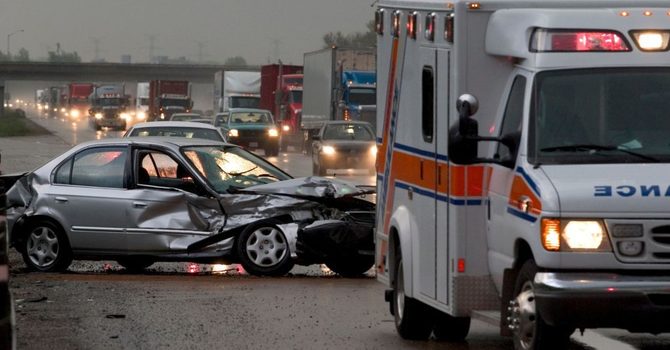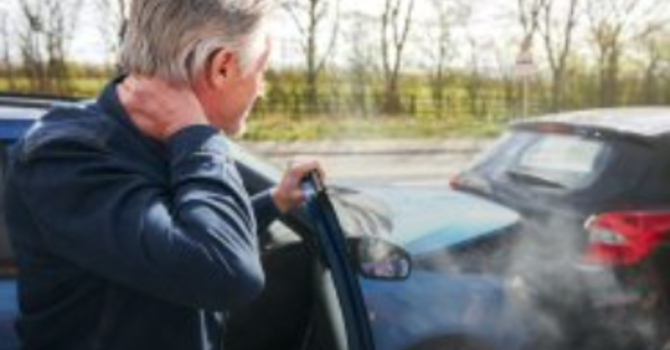
You woke up this morning — two days post-car accident — with a swollen, stiff knee. It’s difficult to bear weight and it hurts when you walk.
With the force and impact that occur during a car accident, it’s no surprise that knee injuries can result. But how do you properly diagnose and rehab pain in the knee after a car accident?
Learn about the most common knee injuries caused by car accidents, who to see for healing, why it’s important to treat knee injuries, and more.
Table of Contents
- What Are the Main Causes of Knee Pain After a Car Accident?
- How To Know When It’s Time To See a Doctor for Knee Pain After a Car Accident
- Who Should You See for Rehab for Knee Pain After a Car Accident?
- What Happens When a Knee Injury Is Left Untreated?
- Cascade Spine & Injury Center: When Ice Just Isn’t Enough for Knee Pain After a Car Accident
What Are the Main Causes of Knee Pain After a Car Accident?
Experiencing pain in the knee after a car accident is common — whether through the impact of your knee hitting the dashboard or from the compression of pushing down onto the brake or floor.
If you’ve experienced a car accident that has caused knee pain, you may notice:
- Swelling
- Bruising
- Clicking
- Difficulty straightening the knee
- Locking of the knee joint
- The knee gives in when walking
Some of these injuries — like bruising — are minor and likely don’t require treatment if no other symptoms are paired with them. Others, though, may require some form of medical care for complete healing.
Cascade Spine & Injury Center is a multidisciplinary center that focuses on helping our patients recover from auto-accident-related injuries. If you’ve experienced knee pain from a car accident, contact us today.
Compression Injuries
Compression injuries often occur during front-end collisions when the car becomes compressed and the force of impact pushes through the foot into the knee.
Typically, the knee and dashboard make contact, most commonly causing one of three major types of knee ligament tears.
Posterior Cruciate Ligament (PCL)
The PCL is the ligament inside the knee that helps connect the femur to the tibia. PCL injuries are most common during car accidents because they require a powerful force to affect the inner ligament. “Dashboard knee” is a result of severe twisting or force of the knee on impact with the dashboard during an auto accident, causing a PCL tear.
If you’ve experienced a PCL tear from an auto accident, your symptoms might include:
- Steady pain
- Swelling
- Difficulty walking
- Instability
To properly diagnose and treat a PCL tear, a visit to a medical professional is necessary.
Anterior Cruciate Ligament (ACL)
The ACL is a strong band ligament that connects the femur to the tibia. Most often, ACL tears happen from a sudden stop or change in direction. Direct impact to the knee or sudden twisting and jarring during an auto accident can lead to this ligament tear.
Signs of an ACL tear might include:
- A loud pop or popping sensation
- Severe pain
- Inability to walk or move
- Rapid swelling
- Loss of range of motion
- Instability
To accurately diagnose and treat an ACL tear, prompt and accurate medical attention is required.
Medial Collateral Ligament (MCL)
The MCL — the major ligament on the inside of the knee — can tear during an auto accident due to impact on the other side of the knee, hyperextension, or a forceful shift in direction.
Generally, MCL tears are classified into one of three grades:
- Grade 1: Mild with less than 10% of fibers torn and knee is still stable
- Grade 2: Moderate with a partial tear
- Grade 3: Severe tear with completely torn ligament and knee is unstable
MCL tear symptoms will vary depending on the grade, but generally include:
- Tenderness
- Mild to intense pain
- A popping sound at the time of injury
- Instability
- Stiffness
- Swelling
A physical exam, and sometimes imaging, are required to properly diagnose an MCL tear and recommend treatment.
Impact Injuries
Knee impact injuries — commonly referred to as ‘dashboard knee’ — are the most common sites for loose bodies that might originate from fractured bone fragments, torn cartilage pieces, or exogenous foreign bodies that enter through penetrating trauma (like a car accident).
Most often, impact injuries occur when a seat-belted passenger experiences an auto-related accident.
Typically, medical teams see impact injuries like:
- Soft tissue lacerations
- Bruising
- Meniscal tears
- Dislocation
- Ligament injuries
- Fractures
Meniscus
The impact from an auto accident can sometimes cause a passenger’s knee to hit the dashboard, tearing the meniscus. This happens as a result of hyperextension of the knee during impact.
A torn meniscus, the cushion for your knee, can cause debilitating pain. You might experience:
- Swelling
- A popping sensation when the injury occurs
- Stiffness
- Pain, especially when twisting or rotating the knee
- Inability to straighten the leg
- Giving out when walking
Because the knee is the largest joint in the body, something like a torn meniscus can affect many seemingly simple daily tasks like walking, standing, or sitting.
However, even if you can sit, stand, or walk without pain, there’s a chance you may still be suffering from a torn meniscus if you have any of the aforementioned symptoms.
There are different types of meniscus tears, and although some do heal on their own, others do not. To be sure, seek medical attention right away if you’re experiencing knee pain after a car accident.
Ligament
A torn ligament is a soft tissue injury that can occur from impact during a car accident. The trauma from a car accident can cause overstretching of one of the four ligaments in the knee, ultimately causing a tear:
- A tear in the ligament that controls the backward movement, the PCL, typically happens from direct impact with the dashboard during a collision.
- A tear in the ACL may occur from overextending, twisting, or being struck.
- The MCL balances the inner knee and can be torn by blunt trauma that forces the knee sideways, like hitting the door of a car.
- A torn LCL, the ligament that keeps the outer part of the knee stable, can occur from a sudden sideways blow to the knee.
You may be experiencing a torn knee ligament if:
- Your knee is inflamed
- There’s pain around the kneecap
- You hear a popping sound when walking
- Your knee buckles when walking
For a proper diagnosis and treatment plan, medical imaging is required.
Fracture
A kneecap fracture, or fracture to the bones surrounding the knee, can occur when there’s a direct blow to the dashboard or steering wheel during an auto accident.
Knee fractures can happen at varying degrees — at the top, bottom, center, or more than one spot — in the knee.
Typically, knee fractures cause:
- Swelling
- Bruising
- Inability to walk
- Inability to straighten the leg
- Pain
Sometimes, depending on the exact location and the severity of the knee fracture, surgery is required for complete healing. But the only way to be sure is to visit a medical team if you’re experiencing any of these symptoms following a car accident.
Dislocation
When a knee becomes dislocated, there’s a misalignment of bones in the knee — either the patella, femur, or tibia — that has resulted from the strong impact of a car accident.
Typically, passengers know they’ve dislocated their knee because it’s immediately accompanied by severe pain and a popping sound.
You might also experience:
- Swelling
- Redness
- Tenderness
- Knee giving out
- Inability to bend the knee
- Inability to straighten the knee
- Numbness in the lower leg or foot
Although it seems like anyone can restore the alignment of the bones, visiting an experienced physician to receive professional medical attention will help avoid more problems, like damaging blood vessels surrounding the knee.

How To Know When It’s Time To See a Doctor for Knee Pain After a Car Accident
Unless your knee pain after a car accident is immediate and intense, you may not realize you have an injury to your knee for several days.
For example, if you experienced an auto accident early this morning that left your knee feeling tender, with mild discomfort when you walk, you might just chalk that pain up to soreness following the accident. However, delayed onset of symptoms is common for many knee injuries caused by accidents.
At Cascade Spine & Injury Center, we recommend visiting a medical professional right away if you’re experiencing any pain or tenderness following a car accident to be sure no major injuries have occurred. If they have, we can help properly diagnose and treat your knee injury to help symptoms from worsening.
Who Should You See for Rehab for Knee Pain After a Car Accident?
Although many knee injuries resulting from a car accident can be treated with non-emergency care providers, there may be an occurrence where intense or life-threatening injuries require immediate care. If that is the case, you should visit the emergency room right away.
On the other hand, superficial knee injuries that cause swelling or tenderness may be treated at home following the RICE method and using over-the-counter medicines, like ibuprofen.
For many knee injuries that result from car accidents, visiting medical providers to help assess, diagnose, and treat the injury is best.

Primary Care Physician
A primary care physician (PCP) can see you following a car accident to help prevent symptoms from worsening or diagnose and potentially treat a knee injury, depending on what it might be.
If necessary, your primary care physician can order X-rays and prescribe medications that might help with swelling or pain. If further treatment is needed, your PCP will give referrals to necessary doctors — like orthopedists, surgeons, or chiropractors — for proper care.
Orthopedist or Orthopedic Surgeon
When you experience injuries to your musculoskeletal system (like your knee), an orthopedist can help provide relief from pain and treat the injury. If necessary, an orthopedic surgeon will perform surgery.
You may need to see an orthopedist if your knee injury provides symptoms like:
- Inflammation and swelling
- Stiffness
- Restricted movement
- Popping or snapping sound during the injury or when the knee is moved
- Intense pain
Physical Therapist
If your knee injury resulted in surgery, a physical therapist will handle your post-surgery care. They will help ensure you’re properly strengthening the knee and its surrounding muscles to help it reach its full capacity again.
You might be asked to work with a physical therapist and another doctor — like a chiropractor — to experience the best possible results.
Chiropractor
Visiting a chiropractor following a knee injury is ideal because not only can chiropractors help care for the knee injury, but they also ensure total body health. For example, while you’re favoring one knee during your injury recovery, you might begin experiencing secondary injuries — like a misaligned spine — as a result. Your chiropractor can ensure your knee heals properly without causing injuries to other body parts.
A chiropractor will help assess, diagnose, and treat your knee injury by offering appropriate modalities, like:
- Exercise therapy
- Stretching
- Massage therapy
- Acupuncture
- And more
Alternative Therapies
Sometimes, major treatments like surgery or intense physical therapy aren’t the answer to healing a knee injury. In some cases, using alternative therapies — like massage or acupuncture — can help alleviate pain during the healing process.
At Cascade Spine & Injury Center, our multidisciplinary clinic offers a variety of therapies all in one location. At our center, patients can receive:
- Chiropractic care
- Acupuncture
- Massage therapy
- Physical therapy
- And more
When it comes to car accident-related injuries, Cascade Spine & Injury Center has everything you need to help properly heal.
What Happens When a Knee Injury Is Left Untreated?
Untreated knee injuries may lead to a lifetime of discomfort and decreased function.
If you experience pain in your knee after a car accident and ignore the pain and symptoms, you could be facing:
- Lifetime chronic pain
- Increased risk of re-injury
- Nerve damage
- Artery damage
- Knee joint instability
- Arthritis
- And more
Don’t live a life full of pain and uncertainty. Visit Cascade Spine & Injury Center following a car accident to properly assess, diagnose, and treat your knee injury.

Cascade Spine & Injury Center: When Ice Just Isn’t Enough for Knee Pain After a Car Accident
Knee pain after a car accident is unpleasant.
The constant reminder of discomfort when you try to sit, stand, walk, or adjust, will not likely go away on its own. That’s why visiting a medical professional immediately following a car accident is so important.
At Cascade Spine & Injury Center, we focus on helping patients suffering from auto accident injuries, including the knee. Our multidisciplinary center offers many on-site modalities to properly assess and treat different knee injuries and help patients get back to functioning as quickly as possible.
If you’ve experienced a car accident that has left you in pain, contact our clinic today. Let the team at Cascade Spine & Injury help you find relief.
The content in this blog should not be used in place of direct medical advice/treatment and is solely for informational purposes.





